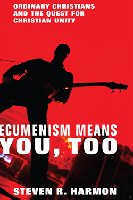BIRMINGHAM, Ala. (ABP) — A new book written by a Baptist professor applies theological themes found in the music of the Irish rock band U2 to the quest for Christian unity.
In Ecumenism Means You Too — pun intended — Steven Harmon, associate professor of divinity at Samford University's Beeson Divinity School, describes a conversation a few years ago with a colleague at Campbell University Divinity School, where Harmon taught at the time. They were discussing a summer course on "ecumenism" — the organized attempt to foster cooperation and unity among Christian denominations.

|

Steven Harmon
|
The colleague commended the idea with the observation, "After all, as U2 said, 'We're one, but we're not the same.'" The line is from the band's song "One" from the 1991 album Achtung Baby. That sparked an idea that Harmon fleshed out in a 2008 lecture titled "U2 and the Eschatology of Ecumenism," workshops including one at the 2009 General Assembly of the Cooperative Baptist Fellowship and ultimately Harmon's third book.
Subtitled Ordinary Christians and the Quest for Christian Unity, Harmon's book is not about theological themes in the music of U2, a topic that has been explored by scholars and pastors throughout the band's three-decade career. Instead he invokes ideas drawn from U2 lyrics to help build a case that seeking unity in the body of Christ is "an inescapable obligation of Christian discipleship."
Even though the Gospel of John reports that on the eve of his crucifixion the main thing Jesus prayed for his disciples was "that they may be one," Harmon says much of the story of the next two millennia was about how the church lost its unity. Various attempts to bridge those differences, including the modern ecumenical movement in the 20th century, have been stymied by various factors. One barrier for many evangelicals, Harmon says, is suspicion that ecumenism means a "lowest-common-denominator approach that compromises core convictions in the interest of securing a superficial unity."
For Harmon, however, the quest for Christian unity is a matter of "eschatology," a technical term for theology that deals with "last things." Typically concerned with end-time events, Harmon borrows from Baptist theologian James McClendon to give the term a broader meaning of referring to "what lasts" — God's ultimate goals for creation and the role of God's people in bringing them to pass.
For mainstream Christians, Harmon writes, the eschatology of the Bible reflects a tension between the "already" and "not yet." He says it's an outlook shared in music like U2's "I Still Haven't Found What I'm Looking For" from 1987's The Joshua Tree.
Sign up for our weekly edition and get all our headlines in your inbox on Thursdays
"The 'already' dimension of Christian faith is stated in no uncertain terms: 'You broke the bonds and you loosed the chains/carried the cross and all my shame,'" he observes. "But even that has not yet completely transformed all that is wrong with the world (or the singer): 'But I still haven't found what I'm looking for."
Harmon describes the overarching sound of a U2 song as "yearning." The band's most successful single, 1987's "With or Without You," voiced the pain of fallen relationships. Harmon says Bono didn't have the quest for Christian unity in mind when he wrote the song, but all U2 songs have "multiple layers of meaning" that he applies to the church.
"We often find it impossible to live with the other, and yet the truth is that we can't live without the other, because the other belongs to our very identity as persons-in-relationship," Harmon writes. "That's true of human relationships in general, and it's true of relationships within the body of Christ in particular. Because we're one body, because we're members of one another, we can't live without another member of the body of Christ."
In the midst of current divisions in the church, Harmon says, "We find it all too easy to decide that we can't live with certain other Christians — that it would be easier simply to live without them."
"We tend to explain denominational identity in terms of how our denomination isn't like other denominations," he continues. "We pride ourselves in the superiority of our own denomination and contend that we have no need to seek full visible unity with other churches from which we're separated, for we don't think we need them — we're doing quite well on our own, thank you very much, and at any rate visible unity with other traditions would compromise our distinctiveness."
"So we're tempted to think," he writes. "But we can't live without those from whom we are separated in the divided body of Christ. The body of Christ is wounded, and some of those wounds were inflicted by other churches on our own communion long, long ago, while other wounds have been inflicted more recently by fellow members of our own denominations in the intra-denominational strife that has torn apart most Christian communions today."
Harmon says it would be easy for Christians to go their separate ways, but in light of Jesus' prayer for the visible unity of his followers, "We can't live without them." The appropriate response of Christians wounded by fellow Christians, Harmon says, is Jesus' response to those who wounded him: "And you give yourself away."
Harmon, who has a Ph.D. from Southwestern Baptist Theological Seminary, joined the Beeson Divinity School faculty in 2008. He teaches church history and doctrine and Christian ethics. He specializes in "patristics," study of the church fathers, and ecumenical theology. His previous books are Towards Baptist Catholicity: Essays on Tradition and the Baptist Vision, published in 2006, and Every Knee Should Bow: Biblical Rationales for Universal Salvation in Early Christian Thought, published in 2003.
Harmon said the book has been out for about two months, and he is encouraged by the initial response.
"Both professional ecumenists and the 'ordinary Christians' for whom I wrote the book have told me that there's nothing else like it as a resource for motivating and facilitating ecumenical engagement where it really matters — at the grassroots, in local relationships between Christians and their churches," he said. "If my book helps that happen here and there in some small way, I'll be happy."
Related article:
Music review: Grace inside a sound — U2, 'No Line on the Horizon'
Facebook page for Ecumenism Means You Too















We seek to connect God’s story and God’s people around the world. To learn more about God’s story, click here.
Send comments and feedback to Eric Black, our editor. For comments to be published, please specify “letter to the editor.” Maximum length for publication is 300 words.